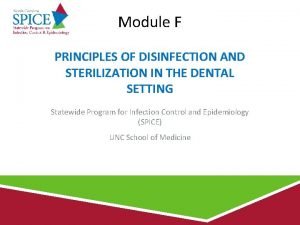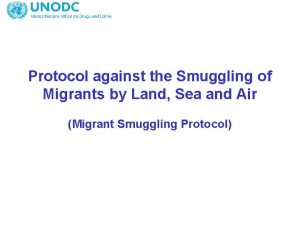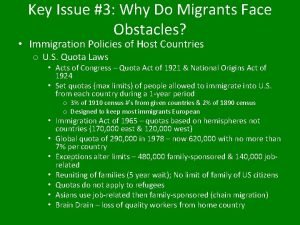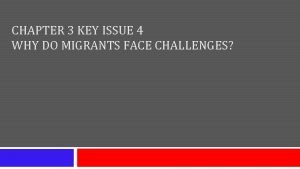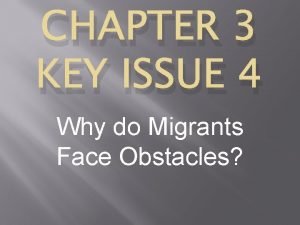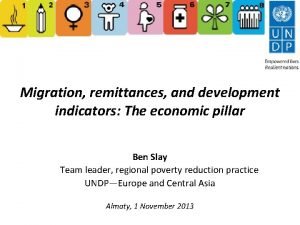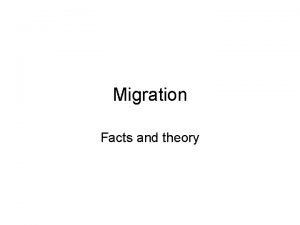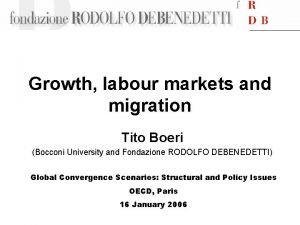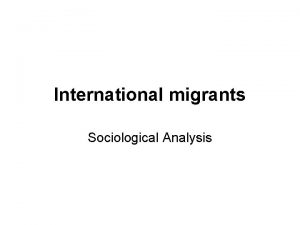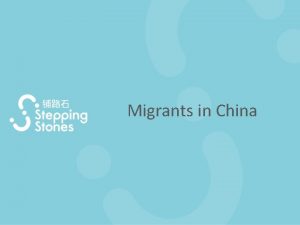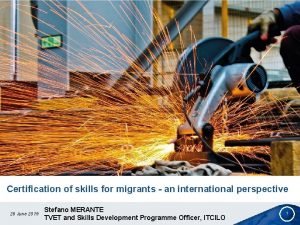Management of international migrants with critical skills and








- Slides: 8

Management of international migrants with critical skills and capital 1

Situational analysis Ø The United States has long been the ultimate "IQ magnet" for highly skilled migrants. But this trend has changed dramatically in recent years. Today, the United States is no longer the sole—nor the most sophisticated—national player engaged in recruiting the "best and brightest" worldwide. Ø Other attractive immigration destinations, such as Canada, Australia, and the United Kingdom, have created selective immigration programs designed to attract these highly skilled migrants. Ø RSA has on the other hand historically found it difficult to attract highly skilled persons, either through the critical skills permitting regime or the establishment of foreign owned businesses. Ø Instead SA continues to attract large numbers of low skilled migrants mainly from the SADC countries and other developing countries including India, Pakistan and Bangladesh. 2

Situational analysis Ø As such, immigration statistics are skewed towards low skilled migrants rather than highly skilled persons. Ø Many of these migrants who exhibit low levels of skills or capital go on to obtain permanent residence and then citizenship. Ø The NDP predicts that migration will, in future, be driven more by skilled and better resourced people rather than those responding to economic and political instability. Ø To prepare for this, RSA should have a better regime for attracting these types of migrants to the country. The current white paper draft on international migration policy is aimed very largely at the granting of visas to those with high-level skills or substantial amounts of capital. 3

Strategy to facilitate and support the attraction and retention of foreign migrants with critical skills Ø Critical Skills Visa: Introduced in June 2014 as a replacement to the Quota Work Permit. Ø Business Visa: Issued to a foreigner who intends to establish a business or invest in a business that is not yet established in the Republic. Issued on condition that at least R 5 million as an amount in cash is available to be invested in the Republic as determined from time to time by the Minister, after consultation with the Minister of Trade and Industry Ø General Work Visa: Issued to a foreigner on condition that there is a positive recommendation certificate from the Department of Labour confirming that(i) despite a diligent search, the prospective employer has been unable to find a suitable citizen or permanent resident with qualifications or skills and experience equivalent to those of the applicant; (ii) the applicant has qualifications or proven skills and experience in line with the job offer. 4

CRITICAL SKILLS WORK VISA 5

CRITICAL SKILLS WORK VISA Ø Critical Skills List published in 2014 Ø Consolidated from the Occupations In High Demand List of the DHET Ø An application for a critical skills work visa shall be accompanied by proof that the applicant falls within the critical skills category in the form of – (a) a confirmation, in writing, from the professional body, council or board recognised by SAQA in terms of section 13(1)(0 of the National Qualifications Framework Act, or any relevant government Department confirming the skills or qualifications of the applicant and appropriate post qualification experience; (b) if required by law, proof of application for a certificate of registration with the professional body, council or board recognised by SAQA in terms of section 13(1)(i) of the National Qualifications Framework Act; and (c) proof of evaluation of the foreign qualification by SAQA and translated by a sworn translator into one of the official languages of the Republic. Ø Immigration Directive 22 of 2014 6

CHALLENGES Ø Trades Occupations Ø Fraudulent Qualifications Ø Other supporting documents Ø The relevancy of the professional body Ø SAQA recognition of a professional body Ø Process of Registration and the turn-around time for confirmation Ø Incorrect adjudication Ø Duration of the critical skills work visa 7

8

